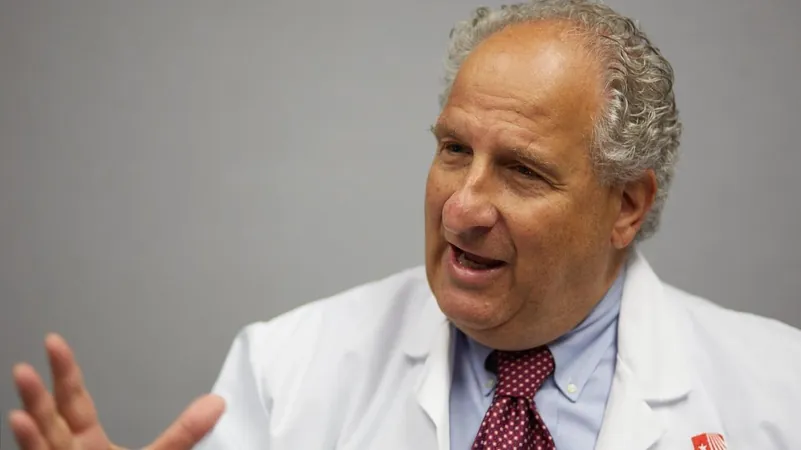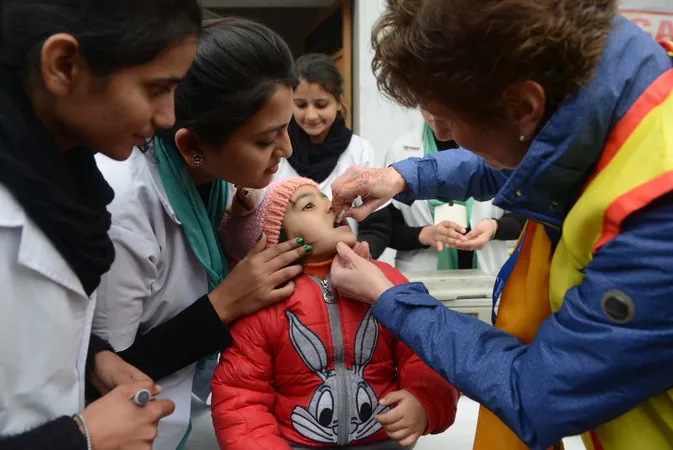
Shocking New Study Unveils Major Risk Factors for Long COVID – What You Need to Know!
2025-01-15
Author: Jessica Wong
A groundbreaking study by researchers at Stony Brook University has highlighted the alarming risk factors associated with long COVID, shedding new light on the ongoing challenges posed by this lingering condition. The findings reveal that individuals who have experienced multiple COVID-19 infections or who faced severe cases are at a heightened risk of developing long COVID, particularly if they were unvaccinated during their initial infection.
The study focused on a total of 2,522 participants who tested positive for COVID-19 between March 2020 and February 2024. Out of these, a staggering 475 were diagnosed with long COVID, with an astonishing 85% (403 individuals) having contracted the virus multiple times. This fact raises crucial questions about vaccination efficacy and public health strategies moving forward.
Conducted in collaboration with the Stony Brook World Trade Center Health and Wellness Program, the research involved essential workers, predominantly first responders, many of whom are still dealing with health complications associated with the September 11 terrorist attacks. This context adds an important layer to the findings and emphasizes the vulnerability of frontline workers during health crises.
According to the published report in The Lancet Regional Health-Americas, the researchers identified a significant correlation between long COVID and factors such as the severity of initial infections and the lack of vaccination at the time of first infection. This revelation is particularly concerning as it suggests that those most at risk are also the least protected against long COVID's debilitating effects.
Lead researcher Sean Clouston noted that although various medical conditions were accounted for in the study, age and gender appeared to have minimal impact—emphasizing instead that the severity of COVID infection was the primary factor leading to long-term health issues. “We could see that even younger individuals who experienced severe COVID were at an increased risk for long COVID,” Clouston stated.
Long COVID, officially recognized as post-acute sequelae, manifests through a variety of persistent symptoms including mental fog, respiratory difficulties, altered taste and smell, and more. Symptoms that endure three months after initial infection, lasting for at least two months, classify individuals as having long COVID.
Experts are calling for continued research into long COVID, particularly since deaths related to COVID-19 have significantly decreased since the pandemic's onset. Dr. Reynold A. Panettiere, Jr., vice chancellor at the Rutgers Institute for Translational Medicine and Science, remarked, “While initial fears were centered around death, now the focus is shifting towards the long-term symptoms that many individuals are experiencing post-infection.”
Although COVID-19 vaccines have played a crucial role in reducing severe illness and mortality, they have not effectively prevented infections, leading to growing frustration within the community. Dr. Benjamin Luft, co-author of the study and infectious disease specialist, emphasized the urgent need for improved vaccines and treatments specifically targeting long COVID. “Long COVID has been so debilitating that we need something effective against it—be it a new vaccine or therapeutic interventions,” he said.
As vaccination rates have waned since the pandemic's peak, there is hope, however. The data indicates a rise in vaccinations in 2024 relative to the previous year. Dr. Luft advocates that the public should not dismiss vaccines altogether but rather demand advancements in vaccine technology to prevent infections more effectively. "We need new and better strategies for the next generation of vaccines," he stated.
As public health experts and researchers push for more comprehensive strategies, this study serves as a vital reminder of the ongoing impact of COVID-19 and the critical importance of vaccination in protecting against long-term effects. Stay informed, stay safe, and remember—your health is your wealth!






 Brasil (PT)
Brasil (PT)
 Canada (EN)
Canada (EN)
 Chile (ES)
Chile (ES)
 Česko (CS)
Česko (CS)
 대한민국 (KO)
대한민국 (KO)
 España (ES)
España (ES)
 France (FR)
France (FR)
 Hong Kong (EN)
Hong Kong (EN)
 Italia (IT)
Italia (IT)
 日本 (JA)
日本 (JA)
 Magyarország (HU)
Magyarország (HU)
 Norge (NO)
Norge (NO)
 Polska (PL)
Polska (PL)
 Schweiz (DE)
Schweiz (DE)
 Singapore (EN)
Singapore (EN)
 Sverige (SV)
Sverige (SV)
 Suomi (FI)
Suomi (FI)
 Türkiye (TR)
Türkiye (TR)
 الإمارات العربية المتحدة (AR)
الإمارات العربية المتحدة (AR)